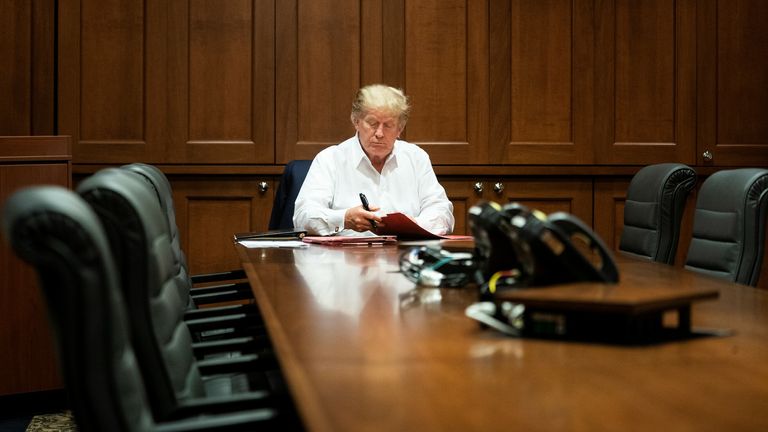US President Donald Trump could be discharged from hospital as soon as Monday as he continues to recover from coronavirus, his doctors have said.
Mr Trump, 74, has been fever-free since Friday and is not complaining of shortness of breath, Dr Sean Conley told reporters outside the Walter Reed Medical Center in Maryland on Sunday.
He is now on dose two of five of the experimental antiviral drug Remdesivir and is not experiencing any side effects.
If things continue to go well, he may be allowed to continue his treatment back at the White House on Monday, his team said.
Dr Brian Garibaldi, a pulmonary specialist, added: “If he continues to look and feel as good as he does today, our hope is we can plan for a discharge as early as tomorrow to the White House where he can continue his treatment course.”
Dr Conley revealed Mr Trump’s oxygen levels dropped before he was admitted to hospital on Friday, which caused concern among his team and saw him given supplemental oxygen.
He said: “Thursday night into Friday morning when I left the bedside, the president was doing well, with only mild symptoms and his oxygen was in the high 90s.
“Late on Friday morning when I returned to the bedside, the president had a high fever and his oxygen levels were transiently dipping below 94%.
“Given these two developments, I was concerned about rapid progression of the illness. I suggested we try some supplemental oxygen, to see how he’d respond.
“He was fairly adamant he didn’t need it. He was not short of breath, he was just tired and he had the fever – that was about it.”
But despite him only needing the extra oxygen for an hour, medics still asked for him to be transferred to the military hospital for observation, he added.
Dr Conley was also quizzed on why on Saturday he refused to admit the president had been given supplemental oxygen at the White House on Friday, when his chief of staff Mark Meadows told reporters medics were “very concerned” about his vital signs before he arrived at Walter Reed.
He said he was “trying to reflect the upbeat attitude of the team” and “didn’t want to give any information that might steer the course of illness in another direction”.
Dr Conley added that “in doing so, [it] came off like we were trying to hide something, which wasn’t necessarily true”.
Former UK US ambassador Sir Christopher Meyer today accused the White House of giving “conflicting messages” about Mr Trump’s health.
He told Sky News this has resulted in a “good deal of scepticism” about his private doctors’ updates.
Yesterday the president recorded a four-minute video message that he uploaded on Twitter, saying he is “starting to feel good” and looking forward to “finishing up the (election) campaign the way it was started”.










